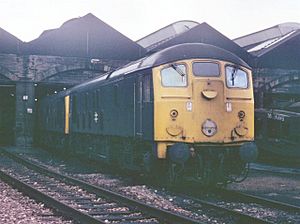British Rail Class 24 facts for kids
Quick facts for kids British Railways Type 2British Rail Class 24 |
|
 |
|
| Class 24, no. 24065 at Motherwell depot, May 1976 | |
| Power type | Diesel-electric |
|---|---|
| Builder | British Railways’ Derby Works, Darlington Works and Crewe Works |
| Build date | 1958–1961 |
| Total production | 151 |
| UIC classification | Bo'Bo' |
| Gauge | 4 ft 8 1⁄2 in (1,435 mm) standard gauge |
| Wheel diameter | 3 ft 9 in (1.143 m) |
| Minimum curve | 4.5 chains (91 m) |
| Wheelbase | 36 ft 6 in (11.13 m) |
| Length | 50 ft 6 in (15.39 m) |
| Width | 8 ft 10 in (2.69 m) |
| Height | 12 ft 8 in (3.86 m) |
| Locomotive weight | Class 24/0: 79 long tons (80.3 t; 88.5 short tons) Class 24/1: 73 long tons (74.2 t; 81.8 short tons) |
| Fuel capacity | Class 24/0: 546 imp gal (2,480 L; 656 US gal) Class 24/1: 500 imp gal (2,300 L; 600 US gal) |
| Prime mover | Sulzer 6LDA28 |
| Generator | BTH RTB15656 DC |
| Traction motors | BTH 137BY, DC, 4 off |
| Transmission | Diesel electric |
| Multiple working | ★ Blue Star |
| Power output | Engine: 1,160 hp (865 kW) At rail: 843 hp (629 kW) |
| Tractive effort | Maximum: 42,000 lbf (186.8 kN) Continuous: 21,300 lbf (94.7 kN) |
| Train heating | Steam generator |
| Locomotive brakeforce | 38 long tons-force (380 kN) |
| Train brakes | Vacuum |
| Axle load class | Class 24/0: RA 7 (6 from 1969) Class 24/1: RA 6 (5 from 1959) |
| Retired | 1967–1980 |
| Preserved | Four (list) |
The British Rail Class 24 was a type of diesel locomotive. These powerful engines were also known as the British Railways Type 2. They were built between 1958 and 1961.
A total of 151 of these locomotives were made. They were built in three different factories. These were Derby, Crewe, and Darlington. The first 20 locomotives were part of a big plan. This was the 1955 British Rail modernisation plan. The Class 24 design was later used to create the even stronger Class 25 locomotives.
Contents
What Was the British Rail Class 24?
The Class 24 was a diesel locomotive. This means it used a diesel engine to create electricity. This electricity then powered motors that turned the wheels. This type of engine is called "diesel-electric."
These locomotives were designed for different jobs. They could pull both passenger trains and freight trains. They were a common sight on British railways for many years.
How They Were Built
The building of the Class 24 locomotives was a big project. It took several years to make all 151 engines. Each one was carefully put together in the railway workshops.
The first locomotives helped British Rail move away from steam engines. This was part of a plan to make trains more modern.
The End of Their Journey
The Class 24 locomotives served for many years. However, newer and more powerful engines were eventually built. Because of this, the Class 24s slowly started to be taken out of service.
The last Class 24 locomotive was number 24081. It was officially retired in 1980. This happened at the Crewe depot.
Images for kids
 | Georgia Louise Harris Brown |
 | Julian Abele |
 | Norma Merrick Sklarek |
 | William Sidney Pittman |



